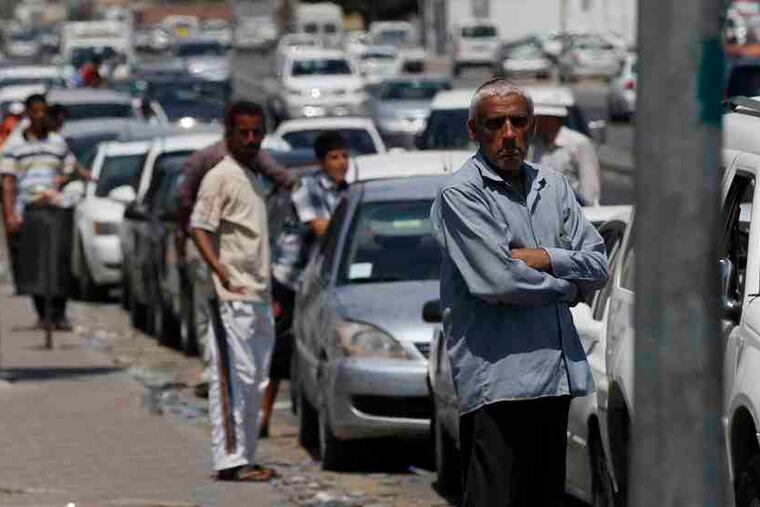Gadhafi's backing wanes
Shrinking rally turnouts, whispers of discontent show weaker support.

TRIPOLI, Libya - Young men waved their assault rifles in the air, spraying celebratory gunfire. Others let off fireworks. Drivers honked and leaned out of their cars, waving green flags and chanting in support of Libyan leader Moammar Gadhafi.
The shaking din of bangs and bullets one recent evening all served to camouflage the thin turnout at a pro-Gadhafi demonstration in his stronghold, the capital of Tripoli. Only several hundred showed up, and many seemed more interested in having fun than in showing solidarity with the regime.
On Friday, nearly two dozen Libyan soldiers, including a colonel and other officers, fled their country in two small boats and took refuge in neighboring Tunisia, where thousands of Libyan refugees have settled.
They fled rebel-held Misrata, arriving at Ketf port, near Ben Guerdane, on the Tunisian side of the border, said a person who met with some of them Saturday, who asked to remain anonymous for security reasons.
The official TAP news agency said 22 members of the military, including ranking officers, arrived Friday in boats carrying a dozen civilians, two with bullet wounds.
Gauging the views of Tripoli's one million residents is difficult because of restrictions affecting journalists. But small signs, such as dwindling attendance at proregime demonstrations, suggest that support in the capital for Gadhafi's four-decade-long rule is on the wane.
Fewer appear willing to be human shields to protect Gadhafi's compound from NATO strikes. Brief gun battles break out in some neighborhoods. There are whispers of dissent.
Authorities violently quelled protests in Tripoli against Gadhafi's rule early in the three-month-old rebellion. Soldiers, police, and other armed men shot and killed demonstrators. They detained suspected protesters, and intelligence agents continue to keep a close watch on residents.
Rebels have had more success so far elsewhere in the country. They have seized swaths of eastern Libya, setting up a de facto capital in Benghazi. In western Libya, the rebels have a toehold in the port city of Misrata and cling to towns along a mountain range.
Tripoli has remained fairly quiet since the initial protests were crushed. Most residents seem focused on surviving through the rebellion, rather than taking sides.
If Tripoli ultimately falls, the cause of the regime's collapse may have less to do with advancing rebel armies than with NATO bombing raids and widespread anger over rising food prices and long lines at the pump.
Since the uprising began in mid-February, food prices have soared. Vegetable oil has risen from less than 1 Libyan dinar to 4 dinars. Pasta, a Libyan staple, has risen from half a dinar to 2 dinars.
Oil production at Libya's major refineries is down to a trickle because of the fighting.
Outside gas stations in the capital, drivers wait two or three days on lines stretching miles.
"Protest? People are too busy trying to get fuel," a taxi driver said of pro-Gadhafi demonstrations.